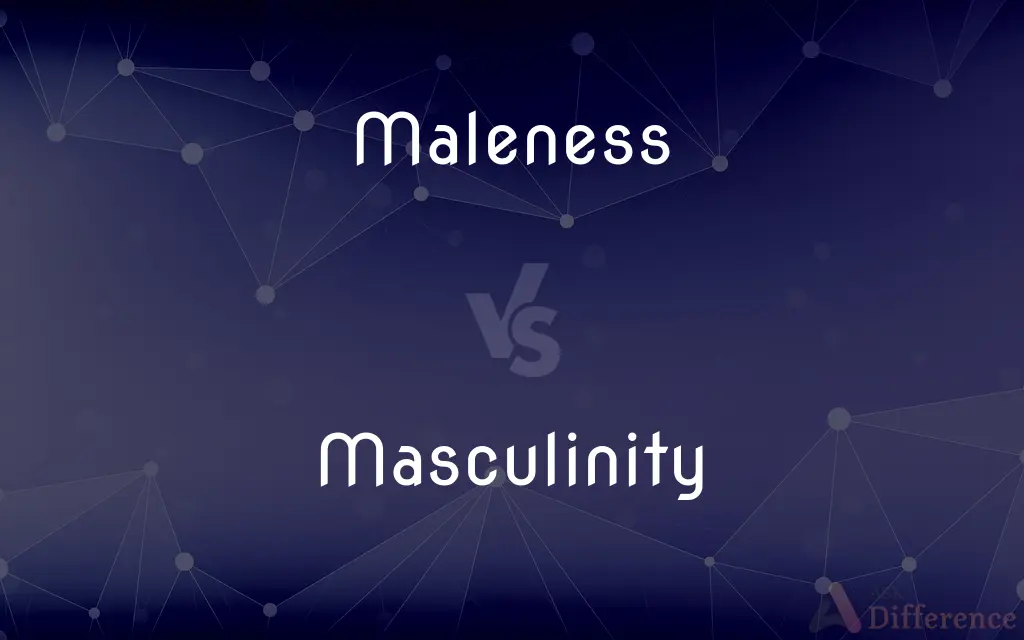Maleness vs. Masculinity — What's the Difference?
Edited by Tayyaba Rehman — By Urooj Arif — Updated on May 9, 2024
Maleness refers to the biological aspects of being male, including physical and genetic traits, while masculinity involves the behaviors, roles, and cultural expectations associated with being male.

Difference Between Maleness and Masculinity
Table of Contents
ADVERTISEMENT
Key Differences
Maleness is defined by biological characteristics such as XY chromosomes and male reproductive anatomy, which are determined at birth. Whereas, masculinity is shaped by societal norms and cultural contexts, defining what it means to act or feel "manly."
The concept of maleness is constant across different societies due to its biological basis. On the other hand, masculinity can vary greatly, as it is influenced by historical, cultural, and personal factors.
In terms of identity, maleness is a straightforward classification within the biological spectrum. Masculinity, however, involves a more complex interplay of identity, self-perception, and societal expectations.
While maleness is typically identified and understood from a medical and scientific viewpoint, masculinity is often discussed in the realms of psychology, sociology, and cultural studies.
Comparison Chart
Basis
Genetic and physiological
Societal norms and cultural context
ADVERTISEMENT
Variation
Consistent across cultures
Varies significantly across different cultures
Fields of Study
Biology, Genetics
Sociology, Psychology, Gender Studies
Implications
Biological and health-related
Psychological and social
Compare with Definitions
Maleness
Pertaining to the male part of a species’ population.
Population studies often analyze data based on maleness and femaleness.
Masculinity
Often discussed in the context of gender studies and social sciences.
Scholars debate how masculinity affects both individual identities and societal structures.
Maleness
A classification used in biology to describe organisms with the potential to produce sperm.
In many species, maleness is associated with specific roles in reproduction.
Masculinity
A cultural construct that can vary greatly between different societies and over time.
Contemporary discussions about masculinity often address its fluidity and the pressures it creates.
Maleness
The genetic setup leading to the male, including specific gene expressions.
Researchers study the SRY gene to understand the genetic components of maleness.
Masculinity
The societal expectations that dictate how men should behave or appear.
In many cultures, showing emotion is considered not aligned with traditional masculinity.
Maleness
The biological state of being male, often identified by XY chromosomes.
Maleness is determined at conception when the chromosomes pair as XY.
Masculinity
Can be a source of debate regarding gender norms and stereotypes.
The challenge against traditional masculinity norms has grown in modern societies.
Maleness
Of or denoting the gamete that is smaller and more motile than the other corresponding gamete. Used of anisogamous organisms.
Masculinity
A set of attributes, behaviors, and roles associated with boys and men.
Masculinity often emphasizes traits like strength and independence.
Maleness
Relating to or designating organs, such as anthers or antheridia, that produce gametes capable of fertilizing those produced by female organs.
Masculinity
Masculinity (also called manhood or manliness) is a set of attributes, behaviors, and roles associated with men and boys. Although sociologists think of masculinity as socially constructed, there is also widespread recognition that some behaviors considered masculine are influenced by both cultural factors and biological factors.
Maleness
Bearing stamens but not pistils; staminate
Male flowers.
Masculinity
Of or relating to men or boys; male.
Maleness
Designating an object, such as an electric plug, designed for insertion into another part or a socket.
Masculinity
Characterized by or possessing qualities traditionally attributed to men, such as aggressiveness.
Maleness
A male organism.
Masculinity
(Grammar) Relating or belonging to the gender of words or forms that refer chiefly to males or to things grammatically classified as male.
Maleness
A man or boy.
Masculinity
(Music) Ending on an accented beat
A masculine cadence.
Maleness
The characteristic, state or condition of being male.
Masculinity
The masculine gender.
Masculinity
A word or word form of the masculine gender.
Masculinity
(Archaic) A male person.
Masculinity
The degree or property of being masculine or manly; manliness.
Masculinity
The state or quality of being masculine; masculineness.
Masculinity
The trait of behaving in ways considered typical for men
Common Curiosities
What is the primary difference between maleness and masculinity?
Maleness is a biological classification, whereas masculinity is a social and cultural construct.
Are there positive aspects of masculinity?
Yes, aspects like responsibility, courage, and leadership are often positively associated with masculinity.
How is maleness determined?
Maleness is determined by biological and genetic factors such as the presence of XY chromosomes.
Why does masculinity vary across cultures?
Masculinity varies due to different cultural norms, values, and historical contexts that shape gender roles.
How are changes in societal norms affecting perceptions of masculinity?
Changes in societal norms are broadening the understanding and acceptance of various forms of masculinity, reducing the emphasis on traditional stereotypes.
How do different religions view masculinity?
Different religions and cultural backgrounds can have varied and specific teachings regarding the roles and behaviors appropriate for men.
Is masculinity the same as being aggressive or dominant?
While traditional views of masculinity often include aggression and dominance, modern interpretations recognize a broader range of traits and behaviors.
What are some examples of how masculinity is expressed?
Masculinity can be expressed through behaviors, clothing choices, professional roles, and interpersonal relationships, among others.
How is masculinity measured or studied?
Researchers study masculinity using psychological scales, interviews, and cultural analyses.
How does masculinity affect mental health?
Societal pressures to conform to certain masculine ideals can impact mental health, leading to issues like depression or anxiety among men.
Can masculinity be harmful?
Yes, when societal expectations of masculinity emphasize harmful stereotypes, it can lead to toxic behaviors and stress.
Is there a biological component to masculinity?
While masculinity is primarily a social construct, biological factors like hormones can influence behaviors culturally associated with masculinity.
Can masculinity change over a person's lifetime?
Yes, an individual's expression of masculinity can change due to personal growth, experiences, and changing social contexts.
How do media and pop culture influence masculinity?
Media and pop culture play significant roles in shaping and reflecting societal norms about masculinity, often perpetuating or challenging stereotypes.
Share Your Discovery

Previous Comparison
Somnambulism vs. Sleepwalker
Next Comparison
Farmer vs. HusbandmanAuthor Spotlight
Written by
Urooj ArifUrooj is a skilled content writer at Ask Difference, known for her exceptional ability to simplify complex topics into engaging and informative content. With a passion for research and a flair for clear, concise writing, she consistently delivers articles that resonate with our diverse audience.
Edited by
Tayyaba RehmanTayyaba Rehman is a distinguished writer, currently serving as a primary contributor to askdifference.com. As a researcher in semantics and etymology, Tayyaba's passion for the complexity of languages and their distinctions has found a perfect home on the platform. Tayyaba delves into the intricacies of language, distinguishing between commonly confused words and phrases, thereby providing clarity for readers worldwide.
















































